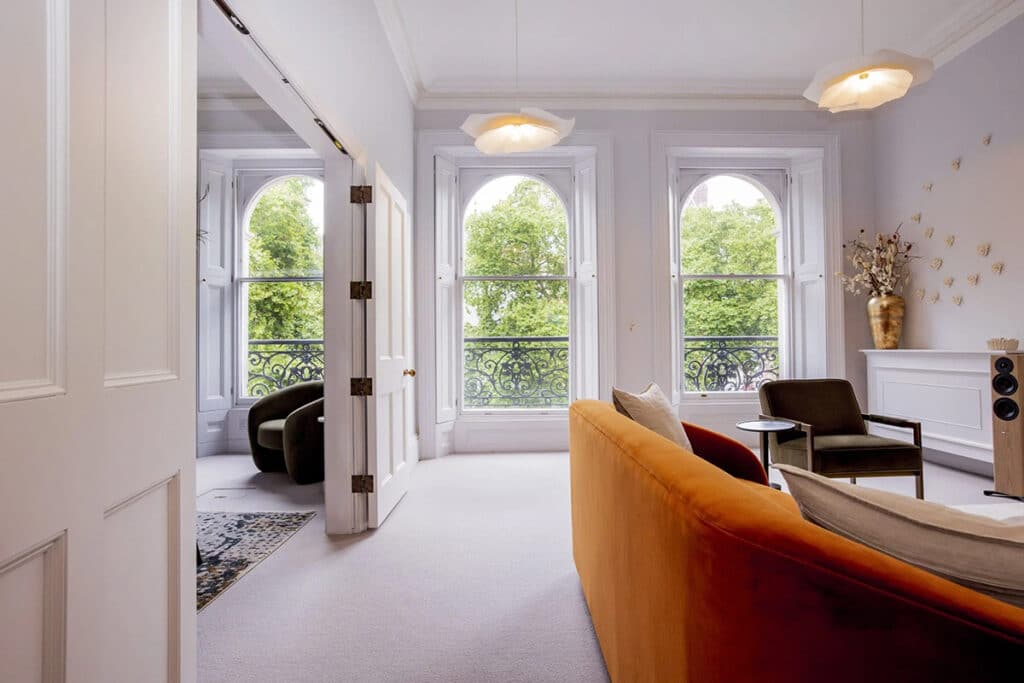A London-based mental health facility has established itself as a discreet safe haven for high-net-worth individuals from the Middle East seeking treatment for disorders including addiction, burnout, anxiety and more. The clinic has implemented stringent privacy measures, ensuring that patients’ mental healthcare remains completely confidential even from their immediate family members, friends, and business associates.
“They come from a different world in a lot of cases, so we’ve created a safe environment for these individuals to get the care that they need away from the eyes of the public away from the weight of expectation,” Janine McNab, COO at Harbor Clinic London said in an exclusive interview with Arabian Business.
Harbor Clinic London has recently seen a growing demand from affluent clients in the Middle East, particularly CEOs and members of dynasty families, who face significant reputational risks if their mental health challenges become known to colleagues, relatives, or the public.
Strict privacy measures have been implemented to meet the growing demand in London, driven by cultural stigmas surrounding mental health in the Middle East.
Clinical Director Shahira Kamal explained that, beyond the need for secrecy, ultra-wealthy individuals cannot engage in standard treatment programs as they often struggle to connect with lower-income groups, and vice versa, making effective treatment significantly more challenging.
“This potential reputational damage that would come from going into a multi-bed facility or other patients not being discreet is huge. Also, a lot of the multi-bed facilities, whether it’s addiction or mental health, understandably have a lot of restrictions. No phones, no meetings because they have to serve the whole group, for a CEO to disappear for four weeks is really, really costly,” she explained.
However, at the clinic, clients can keep their phones on if deemed safe and even attend online meetings, all integrated into their bespoke treatment plans.
“Because we recognise that they have to go back into the world and engage with everything again and we have to balance that they are in treatment, but still need to keep everything afloat outside of treatment,” she said.
Another key factor that the clinic prides itself on is being able to offer bespoke treatments within high standards of living. Treatment packages include a luxury residence, opulent amenities and round-the-clock support starting at £49,995 to £95,000 per week.
“One of the thing we pride ourselves in is that they [ultra-wealthy clients] do not have to compromise on their living standards. We have about 10-15 properties around Belgravia and London with a very high standard of privacy and space,” Kamal said.

The demand from the region has prompted the introduction of Arab-speaking support at the clinic. “We understand the diverse challenges and cultural sensitivities that Arab-speaking individuals may face when seeking treatment for addition, eating disorders or mental health issues,” the website read.
For these ultra-wealthy patients, taking time away in London for weeks at a time for business, real estate or a holiday is not uncommon, making it an ideal location for discreet treatments.
“It is a natural destination for them to want to go and receive treatment in London, especially the reason that it’s a good location is because we have access to some of the best mental health experts and addiction experts, certainly in Europe, if not globally,” McNab said.
The clinic offers a wide range of services addressing several issues such as addiction, neurodiversity, mental health and eating disorders. From the Middle East the clinic has observed “a lot of addiction, which is not a surprise,” she said.
The clinic has also observed rising treatment demand from ultra-high-net-worth individuals with undisclosed, untreated depression and anxiety. Vastly, the treatment patterns are the same, however, the regional difference adds layers of complexities.
According to Kamal, “The extra layer that people from the Gulf and the Middle East add is around shame and secrecy because no one knows. They cannot disclose to their family or their colleagues, there is no support network and they don’t seek support online,” she said.
“There is secrecy around it, something they have not spoken about in years,” she said.
Moreover, in recent times, the clinic has observed an increase in neurodivergent burnout, such as burnout caused from ADHD-related factors. This is especially common in CEOs where neurodivergence can be used to an advantage in their positions, however, “it’s not working anymore.”
Dynastic families constitute a significant portion of the ultra-wealthy clientele in the Middle East. Delving into the challenges faced by this group, McNab highlighted key factors, including a “lack of purpose that leads to a level of anxiety, shame and unhelpful behaviour.”

Kamal highlights a generational divide among dynasty families: the older generation struggles with the pressures of wealth and their influential positions, while the younger generation often feels a lack of purpose, weighed down by the overwhelming expectation to live up to their family’s achievements in wealth and status.
The ‘burden of privilege’
Individuals born into affluent families often experience what the clinic refers to as the “burden of privilege,” a form of intergenerational trauma from the pressure to uphold a legacy, meet high expectations, and navigate complex family dynamics.
“Quite often, the [dynasty] family dynamics are very different to other families. Rather than having a chat around the dinner table, they would have business meetings to talk about how the legacy continues forward, that is quite often the only connection between the individual and their family,” McNab said.
“It can be quite lonely,” she said sympathetically, “we see a lot of this and that’s why we call it the burden of privilege.”
To support clients dealing with this burden, the clinic aims to try to create a safe space complemented by “beautiful residences” offering a path for clients to heal away from expectations and societal pressures in “an environment that is all about healing,” she explained.
With reputations, relationships and businesses at stake, it is not unusual for the clinic to receive inquiries from patients who disguise themselves, claiming to be seeking information for “a friend.”
“The initial calls are veiled with anonymity, not saying names, they have a friend call us or call us themselves and pretend that it’s not for them,” Kamal said.
She explained that building trust with clients to ensure them of the confidentiality level can take anywhere from weeks to months.

“London is a place where it would be natural for a lot of them to come anyway, a lot of them spend summers here in London, have property already, or have family visiting here. So, that removes any questions from people around them. We remove that tension and guarantee confidentiality for them in that way,” Kamal explained.
Due to the high level of confidentiality involved in the treatment, Kamal explained that clients from other regions are often encouraged to go to support groups or talk to their friends and families. However, with clients from the Middle East, these methods are not feasible.
“We are very clear not to suggest that and we know that these are not avenues of support. If they do that, they will be stigmatised further. So, it is about how to help them gain acceptance within themselves, while also acknowledging that they might not be able to tell people about what they’re going through,” she said.
The treatment plan is altered to offer Middle Eastern clients continuous recovery back at home with on-ground staff that the clinic is associated with to help during the “residential phase” of recovery.
‘Money would have solved all the problems’?
A common misconception the clinic frequently encounters is the belief that “money would have solved all the problems.” Due to their high price point, the clinic often receives calls from potential clients who are unable to afford their services.
“I’ve been told repeatedly, if I had that kind of money, I wouldn’t have any difficulties. So the old age idea that money would have solved all the problems, or that someone having experienced a traumatic event that it wouldn’t affect them because they’re too protected – I think this is the biggest misconception,” Kamal said.
She asserted that money “does not protect you, the money sometimes masks it. You’re still able to live, to feed yourself, to travel, to live a sense of a normal life,” which she believes is worse because “the problems are getting worse and the secrets are getting bigger.”
Misconceptions like this are one of the reasons why ultra-high-net-worth individuals cannot seek care in a standard multi-bed facility, and why Harbor Clinic created its specialised services for this wealthy clientele.

The Harbor Clinic programmes come equipped with a recovery coach, a recovery manager, 24-hour support, chefs, cleaners, medical staff, psychiatrist, meditation staff, yoga staff, general practitioners and more. “Every treatment plan and every treatment staff looks different,” McNad said.
In recent times, the clinic has seen rising interest from several Gulf countries and is continuing to expand its services to cater to the unique nature of cases emerging from the region.
“We have seen an influx of people from Dubai and Saudi because there is a lot of pressure for business. The Gulf region has become a very important market for us,” Kamal said.
Looking ahead, the clinic aims to focus on containing on the residential treatment plans in London with emphasis on discretion and privacy. However, strategies could evolve based on the growth trajectory of the company.
“When we ask our clients why they chose London and not the Swiss Alps for instance, it was around the whole privacy aspect. You can hide in plain sight right here, coming to Belgravia, Chelsea, Knightsbridge in London, it’s a safer environment for them to get well in privacy, under discretion,” McNab concluded.








